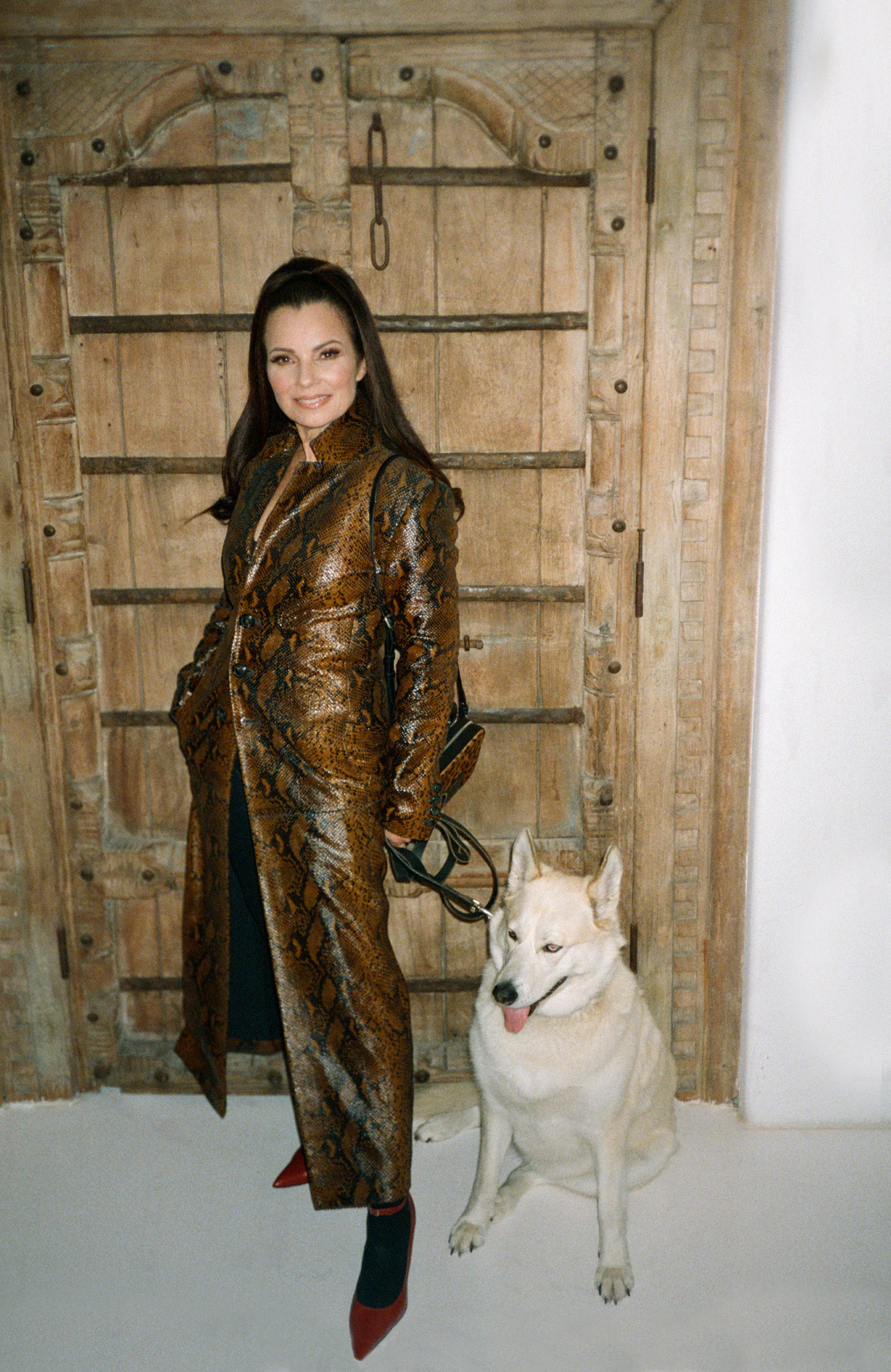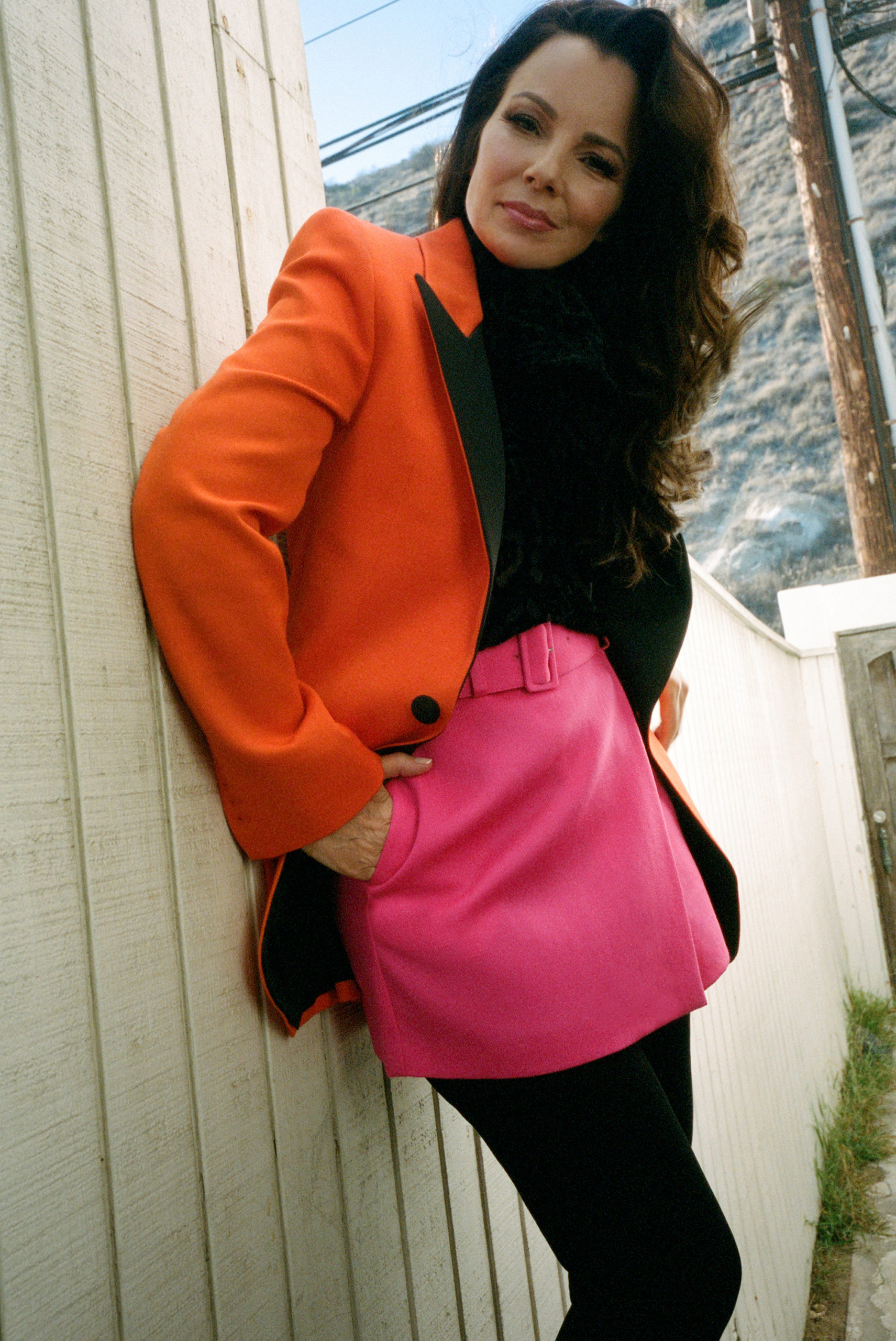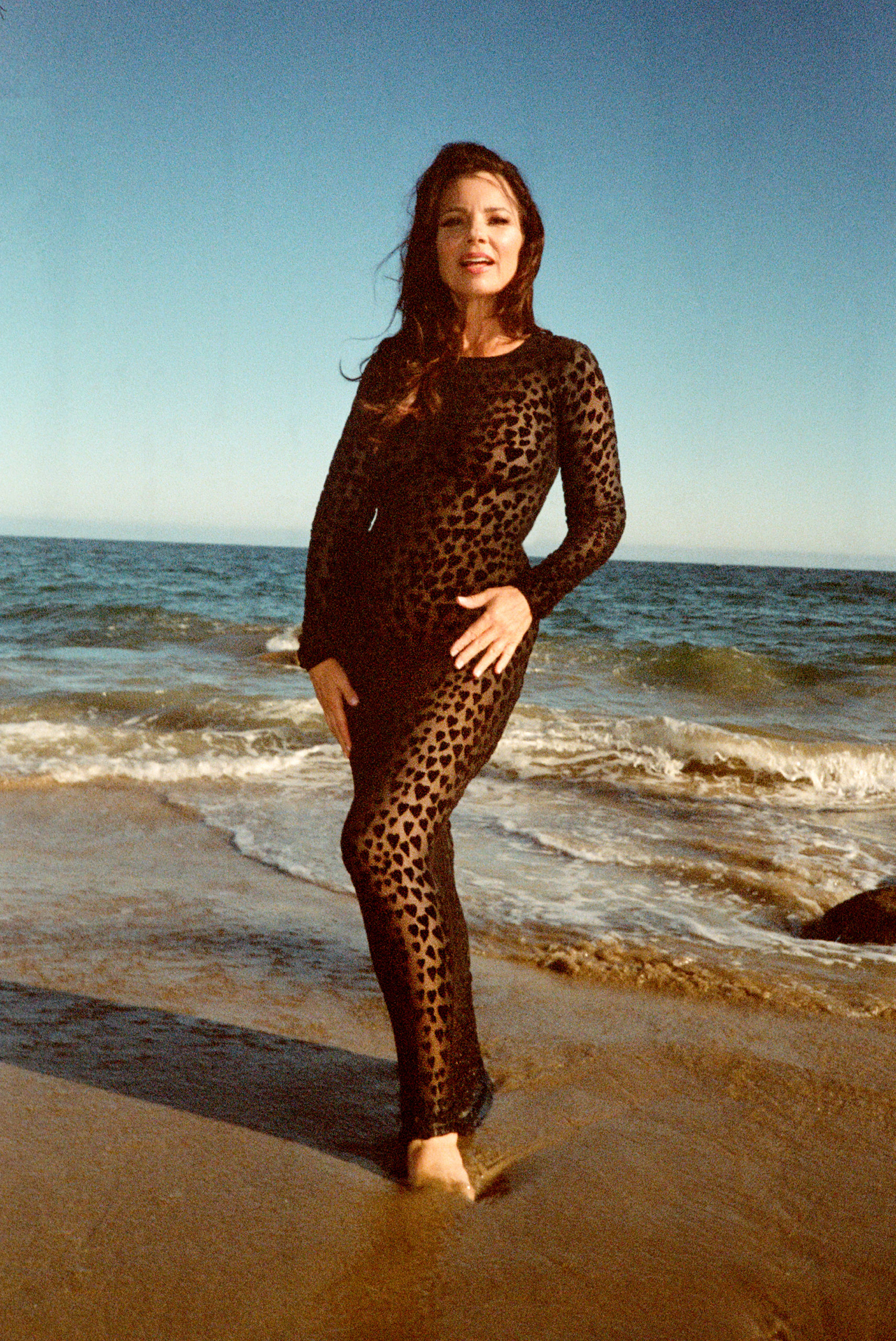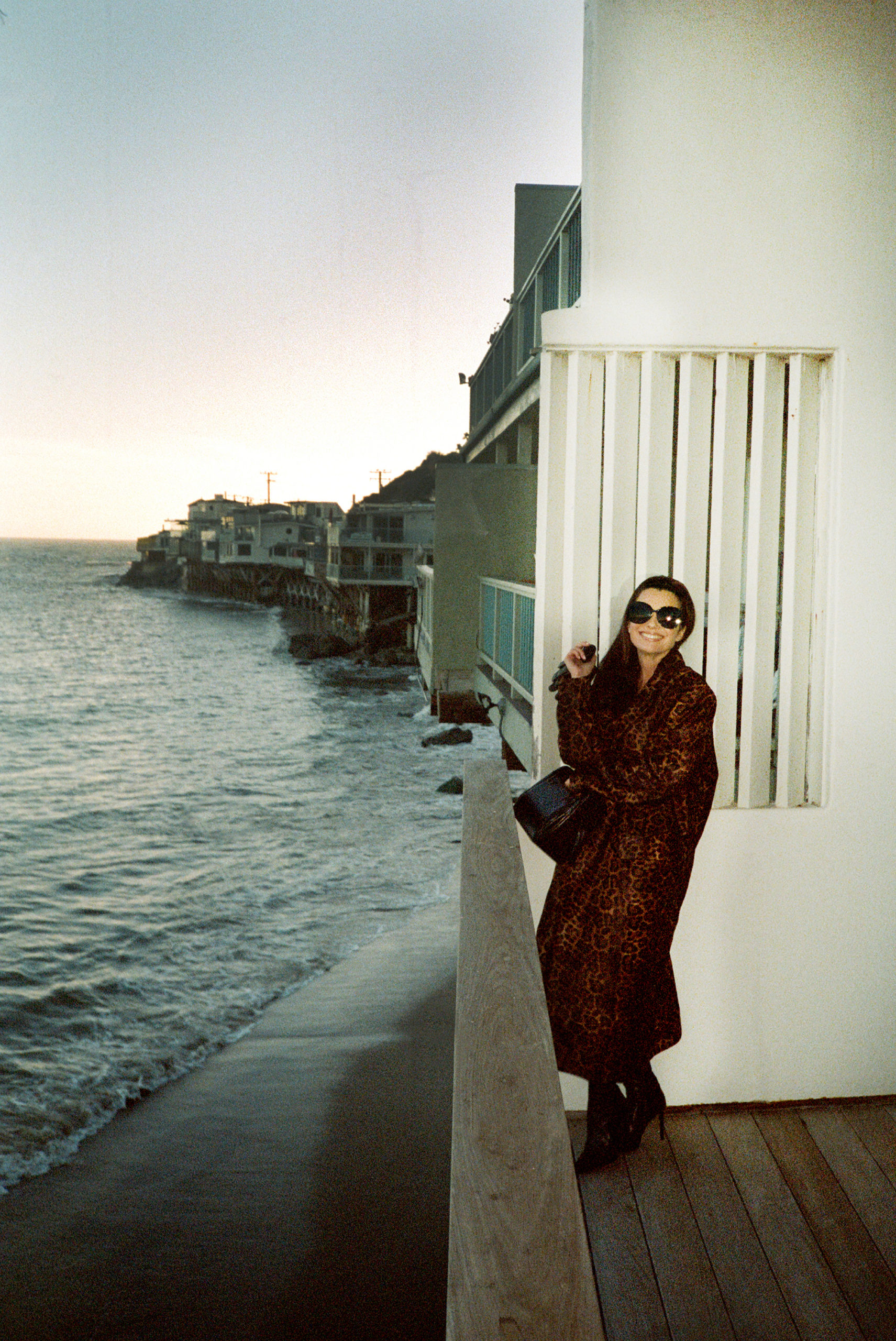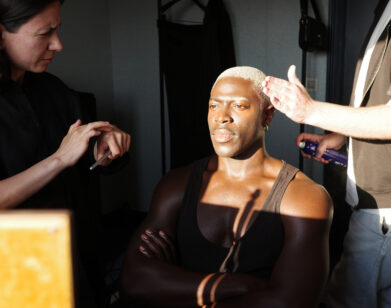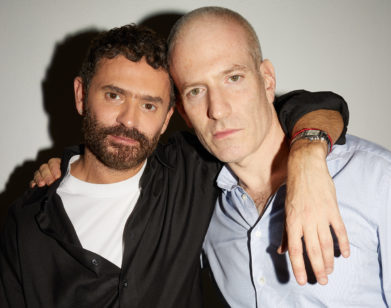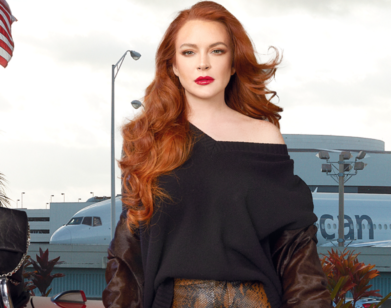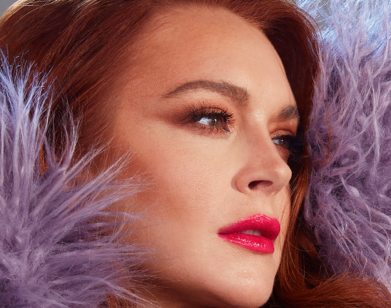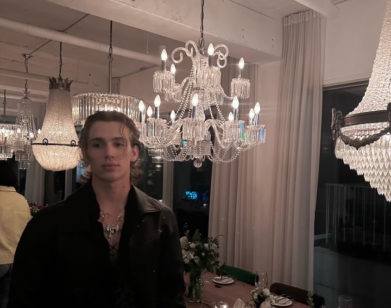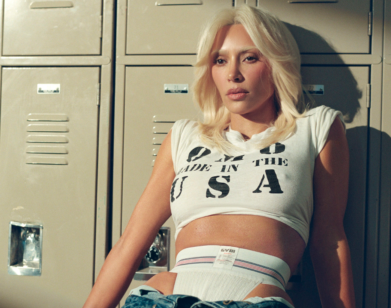DRESS UP
Fran Drescher on Gay Husbands, Activism, and Hourglass Figures
Paris calling Malibu, come in Malibu. It’s Alexandre Mattiussi, the fabulous founder of AMI Paris, and he’s on the line for one of his heroes, the actor and activist Fran Drescher. There’s so much to talk about, like style inspirations, a Judy Garland Legacy Award, and those rumors that Fran’s beloved sitcom, The Nanny, is finally coming to Broadway. But wait, will Alexandre follow Fran’s orders and quit smoking? And will Fran give him her phone number? There’s only one way to find out. —CHARLIE PORTER
———
ALEXANDRE MATTIUSSI: Let’s start. I have some questions. What was the moment you fell in love with fashion?
FRAN DRESCHER: Well, I come from a very humble beginning and a small provincial world. But for some reason, I could see that the style of Audrey Hepburn, who I would see in movies on television, was something that I wanted to aspire to. I knew that her look was very special and different from what I was used to. When I was a little girl, my parents didn’t have a lot of money, but I rarely said I wanted anything, so when I did fall in love with something, they tried to get it for me. I saw this beautiful tweed winter coat that had a neck shawl that wrapped over the shoulder. It was very sophisticated for a little girl. It was expensive for them, but they bought it for me because when I wore that coat, I felt like Audrey Hepburn.
MATTIUSSI: You felt special.
DRESCHER: Yes. I aspire towards something different from where I came from, something more elegant, more wealthy, more beautiful.
MATTIUSSI: You can be so empowered by a piece of fabric. I remember the first time I fit my father’s jacket, I was like, “Oh my god, this is exactly what I want to look like.” It’s crazy. Sometimes just a different color, a different shape, a different texture, can bring you into a new world.
DRESCHER: Without question. We don’t walk around in society naked, so clothes become an expression of who we are and how we feel. It’s a reflection of our inner selves, the you you want to project to the outside world. One of power, one of sophistication, one of fun, one of youth. I always consider clothing wearable art.
MATTIUSSI: Definitely. I like this idea. Who were your fashion inspirations in the ’70s and ’80s?
DRESCHER: I always love going to museums that celebrate fashion—fashion exhibitions. In the ’80s, and certainly in the ’90s when The Nanny was on, I was discovering designers like Todd Oldham and Moschino, but also Chanel. Chanel was starting to get younger in its look. Karl Lagerfeld really brought a youthful energy without delineating away from the core of the brand. He didn’t reinvent the wheel, he just made it better, faster, younger, and more contemporary for the time. He was kind of doing the Chanel version of Madonna.
MATTIUSSI: Yes!
DRESCHER: There was a lot of influence from what Madonna probably took from thrift stores and threw together in a way that was so original. Very often what you see in urban street scenes becomes inspiration for top designers.
MATTIUSSI: That’s funny, because I was thinking about that when I was preparing for our interview. I was born in 1980, and The Nanny was between ’93 and ’99, right?
DRESCHER: Correct.
MATTIUSSI: In ’93 I was 13 years old. We were watching your show every day. I was very inspired by the way you played with fashion. It was very new, very sophisticated, very fun, and very sexy. It was very exciting to see that mix of American and French fashion. That’s why we love you so much. You’re part of the family, part of our lives.
DRESCHER: That makes me so happy. You know, many people say that watching The Nanny was the only time that the whole family sat down together to do something that they all enjoyed. It was something that everybody appreciated in different ways, but together, as a family at the same time. It certainly has endured the test of time. My writing and producing partner, Peter Marc Jacobson, who I was married to at the time—now he is my gay ex-husband. [Laughs]—he had a very good instinct for what makes a star. He knew that you need a lot of eye candy to really enjoy TV, and so, he was the one that said, “We’ve got to have a big staircase, so you can wear the clothes and make an entrance.” And I was the one that found Brenda Cooper [the show’s stylist]. I did a short-lived series [Princesses] with her shortly before The Nanny. And I said to Peter, “If we ever sell our own show, we’ve got to get Brenda.” I knew that she had a certain magic about her. And the thing about The Nanny was we wanted her to be sexy, but not be slutty or cheap-looking or tacky. She was still a nanny. She still had to take care of children. So she had good taste and was never inappropriate, but was definitely someone that loved fashion. And we figured out how a working-class girl could get away with wearing clothes like that by saying that she shopped at Loehmann’s. It’s no longer in business, but at the time, it was a big chain that would buy designer clothes, cut the labels out, and sell them at a drastic discount. And so, because that place existed, we made that the store where Fran found most of her bargains.
MATTIUSSI: In terms of style, did The Nanny inspire you in real life or did your real life inspire The Nanny?
DRESCHER: There were times when there was some overlap. I went through a period when I liked that biker look, while The Nanny was happening. I’d wear motorcycle boots and leather jackets and chains and things. In one episode, she dressed like that, but it wasn’t really her look. She was trying to look like somebody else, but in real life, I actually enjoyed looking like that. Also, at times I dressed more sophisticated than my character in The Nanny. There were times where I’d come down those stairs in gorgeous long evening gowns. I was wearing a lot of that designer—oh god, I’m blanking—the one who sewed together those tight rubber bands?
MATTIUSSI: Hervé Léger, no?
DRESCHER: Yes, yes, yes, Hervé Léger. I wore a lot of that. I even wore an Hervé when I was honored at the Knesset in Israel. He made a blue and white dress, the colors of Israel.
MATTIUSSI: I remember that dress.
DRESCHER: I never wanted to be a fashion victim. I always wanted to complement my figure—and I have an hourglass figure.
MATTIUSSI: Yes. I love models because they have very good personalities, but actresses—you can play a different game with fashion. You know how to move in clothes and you know how to make clothes part of the character. So, you love colors, right?
DRESCHER: Yes. They make you happy. I like monochromatic looks, like I would do the whole thing in all the one color. It makes such a great statement.
MATTIUSSI: I was quite shy at the beginning of my career when I was playing with colors. I always love colors, but you have to be strong to wear color.
DRESCHER: Right. Or you’ll be swallowed up by it.
MATTIUSSI: Exactly. The color can eat you. It has to be at the same energetic level as yourself. So I feel like when I use color for AMI, I mix it. Even for myself, today I’m wearing a bit of blue with gray, but the blue is something I want to share with the people who are going to see me. It’s like a magnetic and energetic way of meeting someone.
DRESCHER: Yes, definitely. They say that pink is very calming. When I was doing The Nanny with Brenda, I put together orange and pink.
MATTIUSSI: That’s amazing.
DRESCHER: She questioned whether they go together, and I said to her, “Those are Gauguin colors and they absolutely go together if you refine your eye to fine art.” I love Gauguin’s paintings, particularly his Tahitian period. I mean, the guy was probably on mushrooms the whole time. [Laughs]
MATTIUSSI: For sure! What did I do this last season for AMI? [Shows phone screen] Pink and orange.
DRESCHER: Awesome.
MATTIUSSI: It’s like fruits.
DRESCHER: Oh god, I want to eat it.
MATTIUSSI: I have another question, but I feel like you already answered it a bit. Why do you think our collective obsession with The Nanny is so enduring?
DRESCHER: Well, it’s classic TV. It has endured the test of time around the world. I think the millennials who were watching it as children were the pioneers of social media. They started watching it again as adults with different eyes, understanding more what the costumes were, what the humor was, that it had a gay sensibility. There were jokes they didn’t get as children that as adults they really appreciate. Between that, and the amazing fashion show each week, they started to generate a lot of new energy on social media. People were really obsessing over it and becoming Nanny fans—Fran fans—all around the world. It started with a streaming channel, and next it’s going to be a Broadway musical.
MATTIUSSI: Social media, as you said, helps to remind us of the past in a very good way. It’s a great source for the history of pop culture. It’s so easy to just open an app and start researching, which is a dream. I wish I had that opportunity when I was younger. I was born and raised in a period of time when the internet didn’t exist. You had to really put yourself out there to discover the world. Now, the world is in your bedroom. And look at us. I’m pretty sure that every night before going to sleep, you switch on an app and see some crazy stupid things, but sometimes there are magical moments of history.
DRESCHER: I wish they would take the politics out of it, and all the lying and people trying to manipulate other people. I don’t like that. But I do like when we share joyful things. I love to see the little baby animals. I love to see fashion. I love to see food. And if it was just confined to that, it would be so—
MATTIUSSI: Dogs and cats, too.
DRESCHER: Exactly.
MATTIUSSI: I have a question for you that’s a little more personal. As a woman, you’ve been a pioneer in this industry. Back in the day you were the writer, the director, the producer—you did everything on that show. Was it a challenge?
DRESCHER: First of all, I didn’t do it alone. I was with Peter, and we had another couple who were also executive producers. I was lucky because the president of the network who bought it and aired it first, CBS, was very female friendly. Not all male executives in high places are, but he was, and he recognized that I had talent in a variety of places. In fact, he once said to me that I was a Russell because I had the curves of Jane Russell, the comic timing of Ross Russell, and the tenacity of a Jack Russell. He was endeared by me and responded favorably to my ambition and talent. Some women get involved with men that are threatened by their success. Peter made me his muse. He completely understood my strengths and how to capitalize on it. And working with Charles Shaughnessy, who played Mr. Sheffield, was a dream because he wasn’t threatened by me and all the power that I had on the stage. He trusted me. He admired me. He knew that if he had any problems, I would listen to him and try to make it right. And we are, to this day, very good friends. I’m very astute to what type of man I’m in the company of, and the ones that I invest most of my time and energy and love and friendship into are ones who are not threatened by women.
MATTIUSSI: I love that. You have been an activist for years and have supported LGBTQIA+ causes. What influenced your activism?
DRESCHER: I’ve always felt like I could be protective of those who are marginalized. I know how to argue on behalf of someone. The Nanny became a gay icon because of the way she looked and acted. She almost had a drag queen quality to her. And so, once The Nanny started, the gay bars were having viewing parties. Then they would have Halloween parades and Wigstock and a lot of people would dress up like Fran. I began to wield my influence in support of the gay community. It was always there, but nobody really cared what I had to say. Once I became famous, it was easier for me to take a stand, to incorporate it in a lot of my interviews and to fight for same-sex marriage. I received many awards for that, and this Thursday, I’m going to be honored at The Hollywood Museum with the first Judy Garland Legacy Award.
MATTIUSSI: Wow! Congratulations.
DRESCHER: Thank you. It recognizes straight people who have consistently gone to the mat on behalf of gay civil liberties, as well as proper representation in media. I’m very excited and proud, and Peter, my gay ex-husband, is going to present.
MATTIUSSI: That’s great.
DRESCHER: I also want to briefly mention, while we were talking about some of the things that I’m passionate about, my foundation Cancer Schmancer. I’m a cancer survivor and my whole thing is making people realize that how you live equals how you feel. And so, we all have to live far more pristinely, honor our bodies, and not allow toxic chemicals and carcinogens to be in our home, in our food, or in our lungs. And to just be kind to our bodies because the whole body is trying to work as best as it can to have you live your best life. I saw you lighting up a cigarette. Sometimes our brain is the worst roommate in the body because it wants to do what it wants to do. Sometimes we have to step outside of our normal ways of thinking and say, “You know, that’s not correct and I’m actually harming myself.”
MATTIUSSI: Yes. I don’t smoke much, but you’re right. This is the little devil in the brain.
DRESCHER: I used to smoke, but I quit. You have to quit a few times before it really sticks.
MATTIUSSI: I quit quite often, actually. I quit for two years, for six months—you know, I’m coughing and I need to cough right now.
DRESCHER: I was at an event the other day that was talking about the Amazon and how the Amazon is the lungs of our planet and they keep cutting down the rainforest. It’s crazy because it’s going to create a lot of turbulent weather in the world because we don’t have that lung capacity on the earth to help us process all the carbon and let out oxygen. And so, I thought to myself, all of these people are here trying to save the planet, but I wonder how many of them are smokers, because we have to be the change that we want to see in the world.
MATTIUSSI: You’re right. I’m going to think about it. I like the metaphor and it’s working very well on me. So next time I see you, I will be a nonsmoker. I promise.
DRESCHER: Wow, how wonderful!
MATTIUSSI: Of course. So what’s next for Fran?
DRESCHER: We’re working on The Nanny musical for Broadway, which is very exciting. And I’m also the president of SAG-AFTRA [the Screen Actors Guild – American Federation of Television and Radio Artists], which is the largest entertainment union in the world, so I’m taking that very seriously. I’m going to Washington all the time and trying to get legislation passed, and I’m still writing. I’m busy and optimistic about many wonderful things on the horizon, but I’m also looking forward to going to Europe. I miss it terribly.
MATTIUSSI: It’ll be fantastic. I would love to have your phone number. We can text and keep in touch. I’m pretty sure you know Paris very well, but I can share good tips and good restaurants.
DRESCHER: I haven’t been there in a couple of years, so I would welcome your suggestions.
MATTIUSSI: I’ll share them with you. I can’t wait to see the pictures, have fun for me. I wish I could be there.
DRESCHER: It’s going to be great.
MATTIUSSI: Ah! I can’t wait.
———
Hair: Jon Lieckfelt
Makeup: Gregory Arlt
Manicure: Chantalynn using Mac Cosmetics at Forward Artists
Fashion Assistant: Erin Ashley

